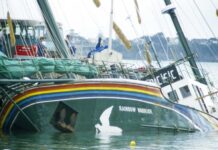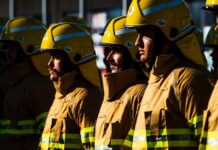Waiheke students on the cusp of the voting age have a message for those who can vote – about not saddling another generation with debt. Geoff Cumming reports.
They have a clear grasp on the issues facing the country; they agree (mostly) on who they would like to see in power and the 2017 election has fired their imaginations.
But at 17, these articulate and thoughtful senior students at Waiheke High School have to bide their time. Their hopes are pinned on the so-called youth quake: the prospect that notoriously disengaged 18 to 30 year olds will be inspired to vote on Saturday.
Year 13 students Georgie Halstead, Jaz Caitcheon, Lorenzo Fini, Ciara Duncum and Eva Blok sat down for a panel discussion with Gulf News to share their thoughts on this year’s election. And while they share the concerns about immigration policy, healthcare, water quality and climate change which have surfaced this campaign, hip-pocket issues would sway them.
Labour’s pledge to progressively introduce free tertiary education would sweep it into power, if these students had a say. They nominate housing, education, the environment (particularly concerns about freshwater quality and use) and immigration as key issues.
The costs of home ownership and associated sprawl loom as big hurdles ahead for this generation. “I don’t think anyone under 30 can buy a house in Auckland at the moment,” Ciara says, although Lorenzo argues that houses are more affordable outside Auckland.
Eva: “An hour out of [the city centre] there are these suburbs of prefab housing.”
Ciara: “I used to live out near Kumeu in West Auckland and it was just paddocks. Now it’s all houses where everything looks the same.”
Jaz: “One moment it’s just green hills then, bang, it’s covered in houses.”
Lorenzo: We need to be doing that if we want to keep up with immigration.”
Ciara: “It’s not homeless people who are going into those houses.”
They seem wary of the clampdown on immigration which the current National-led Government has recently put in place and which Labour is prepared to step-up with restrictions on home-buying.
“It’s nice to imagine we could have completely open borders but it doesn’t work as well when Auckland’s infrastructure can’t cope,” Ciara says.
Environmental issues are another headache. Jaz says irrigation for intensive farming is having a dramatic effect on waterways, particularly the South Island lakes. Eva thinks the water tax that Labour and the Greens have advocated may provide a solution. But she is also worried about nitrates from pastoral farming leaching into waterways.
Ciara says that while a tax implies that someone owns the water, there won’t be any left if it is just given away.
Lorenzo: “Maybe tax isn’t the solution. Act is talking about bringing in a quota system for freshwater a bit like the fisheries quota system.”
Election 2017 seems to have been a rushed affair, they agree – but it has captured their attention.
“All of a sudden we had these new leaders,” Georgie says. Labour replaced Andrew Little with Jacinda Ardern; Greens co-leader Metiria Turei stepped down, while National’s Bill English took over from John Key just before Christmas.
Lorenzo: “A lot of issues people blame National for occurred under John Key’s Government, not Bill English’s.”
Eva: “But it’s not as if Bill English is a first-timer.”
Georgie and Eva agree that Labour’s move to replace its leader was well-timed, particularly as Ardern is well-known in Auckland.
Ciara: “In a way I think it’s good to see so much change in the parties running up to the election because suddenly people are more interested in it. On Waiheke, we can relate to Jacinda far more than to Andrew Little.
Eva: “I didn’t actually know who the leader of the Labour Party was.”
Lorenzo: “He wasn’t very assertive in his views.”
They make the interesting point that the see-sawing polls of recent weeks may not capture the views of younger voters.
Lorenzo: “Personally I don’t think you can rely on the polls.”
Eva: “They’re accurate for a particular demographic who still have landlines.”
They explain the neck-and-neck race between the two main parties as largely down to centre-left voters who had drifted to the Greens moving back to Labour – a combination of the Ardern effect and the Greens’ implosion.
Georgie: “I think the main reason the Greens’ support has fallen is that a lot of people have moved to Labour now that Jacinda’s the leader.”
But, adds Eva, the promise of debt-free tertiary education is another powerful lure for the young – “People think they’ll be able to get through uni debt-free.”
Ciara: “That’s the big one for students in particular.”
They believe priorities are wrong – the money spent on a single motorway could give every student a free education, Georgie says.
Lorenzo” “It may not get Labour in this time but it definitely will next time when we are entitled to vote.”
As for how these inexperienced leaders have conducted themselves, Ardern has earned admiration.
Jaz: “Jacinda’s got balls [general laughter].”
Georgie: “You can tell she’s passionate about being leader.
Eva: “And she comes across as being very professional.
Ciara: “Jacinda’s been saying these things for nine years – it’s not just sudden. It’s really inspiring to see someone that young and passionate and female in with a serious chance of becoming Prime Minister.”
Lorenzo: “This is the first election I’ve paid attention to and it’s become so close. A couple of months ago it wasn’t going to be close.”
Eva: “After the disappointment of the US election there’s a lot of hope.” •







